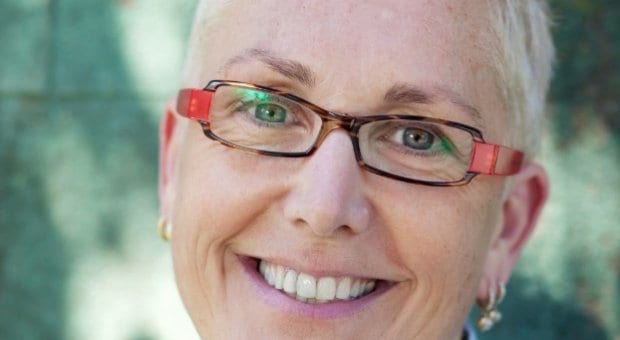A new project led by Dr MK Bryson is combining art and research to explore the territories of “Cancer’s Margins.”
The study, funded by the Canadian Institutes of Health Research, seeks to democratize queer people’s access to knowledge about cancer and improve “cultural competence” in treatment and support.
Large cancer agencies “have tended to take a very conservative road politically,” says Bryson, who is a professor at the University of British Columbia and director of its Institute for Gender, Race, Sexuality and Social Justice.
Diagnosed with breast cancer in 2007, Bryson found a “virtual wasteland” of testimonial regarding queer narratives of cancer diagnoses, treatment and support.
Bryson (who prefers the gender-neutral pronoun they) began a blog and eventually turned their academic work to the question of this dearth of information.
“I think about the research process as a process of witnessing — public witnessing — and of people providing testimonials that are intensely personal, as they are intensely political, as they are intensely artful,” Bryson says.
“Democratization in the case of HIV/AIDS has taken place through bodies on the streets, through ACT UP and other organizations that have insisted on public access” to knowledge and the tools of its dissemination, Bryson explains.
“Patients have knowledge that constitutes evidence [and] healthcare needs to be evidence-based.”
The three-year project will see 200 interviews conducted with individuals who have experienced cancer healthcare as patients or as members of their support networks.
So far, the research has demonstrated the significance for medical providers to consider how gender is experienced differently among people who identify as lesbian, gay, bisexual or trans. “Simply allowing somebody’s same-sex partner to come into the room for the visit with the oncologist or getting the pronoun right when referring to somebody’s partner is very important but utterly inadequate, in terms of thinking about culturally competent cancer health and care,” Bryson says.
Participants in Cancer’s Margins are encouraged to produce mini-documentaries from the video recordings of their interviews with researchers, designed to be shared online and to create a digital archive of stories relevant to queer patients and their support networks.
Bryson recently collaborated with Toronto multimedia artist Chase Joynt to explore stories of undergoing specific surgeries as they may exist for people in contexts of cancer and of trans identification. Their piece, entitled Resisterectomy, is a technically experimental, autobiographical collection of still and moving images and text.
Currently installed at the Gray Center for Arts and Inquiry at the University of Chicago, it involves “speaking to narratives and pursuits of survival and really complicating what survival means,” Joynt says. “Survival in the context of cancer is socially understood to be prolonging life, and I feel like that rhetoric of survival as it relates to trans bodies isn’t understood in the same way.”
“One of the things that you can really see in Resisterectomy, that you can see in my blog, and that we’re finding in our interviews, is that there’s a generational phenomenon that is happening right now,” Bryson says. For the first time in medical history, “the surgeries for breast or gynecologic cancers and the surgeries related to FTM, trans, what we might call SRS surgeries — typically surgeries in terms of mastectomy and hysterectomy — they’re the same surgeries.”
For someone with cancer, Bryson says, “the surgery may or may not have a gendered component that is related to being trans. But it’s absolutely the case that that person will be well aware of other people that are part of their social networks, that are part of their community, for whom this surgery has been about gender.”
This awareness means “there may be very broad questions raised about the significance of having the surgery for their own gender identity,” and in some cases, the surgery may offer the potential to “quite significantly alter a person’s felt sense of their gender identity.”
Members of the project will participate in the first national-scale conference on the subject of LGBT health and cancer, to be hosted in New York City in January 2014.
Cancer’s Margins
queercancer.org

 Why you can trust Xtra
Why you can trust Xtra


